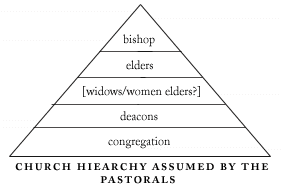
[The picture to the left is the first-century Christian church's hierarchical structure described by Sts. Peter, Paul, James, John, et al. Since the pastoral letters were written, the church's structure has clearly changed.]
I Timothy 3:1ff:
"Here is a saying that you can rely on: To want to bea presiding elder is to want to do a noble work. That is why the president must have an impeccable character. He must not have been married more than once, and he must be temperate, discreet and courteous, hospitable and a good teacher; not a heavy drinker, not hot-tempered, but kind and peaceable. He must not be a lover of money..." [The Jerusalem Bible]
Replace the word president, above, with the word bishop (as found within the newer translations such as the New Revised Standard Version of the Bible), and the idea of what a bishop is to be today, is completely different. This frustrates me. Very much.
To think that in the first century, the time closest to Jesus' life and death, the early Christian Church began its organizational structure based on the teachings of Sts. Peter and Paul which, from above, seems to have indicated that a priest could be married during the early Church. Fast foward to the twelfth century: The Constitutions of the Legate Otho in 1237 C.E., ordered (following two earlier periods of celibacy) that all priests should hence forth be celibate and unmarried, as priests were passing down their inheritance to their children (who in turn became priests, or squandered the parish's land and people) and causing political scandal within the Church and within the secular states the particular parish was within. History points to instances when and where the priests of a parish were more focused on the amount of money they brought in than the spiritual needs of the parishoners. Grant it, this was not the case in all parishes.
But, where biblically, is there reason from Jesus or through his teachings where this is evident? According to I Timothy 3, the priests should be allowed to be married and be allowed to have a child and manage his own house. Not to mention, in other areas of the epistles, there is mention of, at the very least, female deacons (deaconesses).
Faith.
That's what we are told to have in these instances. When I crave to be more than just a lay theologian, but a husband and priest at the same time, reading the Christian Letters such as these from Paul, makes me frustrated that I cannot play a role in both during the twenty-first century. Certainly, I know, there is much spiritual "excercising" and cleansing that I must do before committing to either vocation, but I would love nothing more than the opportunity to do both within my life.
It's January 26, 2006. For two-thousand plus years the Church has stayed on task, for the most part - with little deviation, in portraying who Christ is and what Christ wants of us. For more than seven centuries now, the Roman Catholic priests have been celibate (except for those converts from the Eastern Rite or Anglican faith). Can we not, now, change again to allow the Roman Catholics the same? Oh, how I'd be happy to see that change.
~MJM
No comments:
Post a Comment